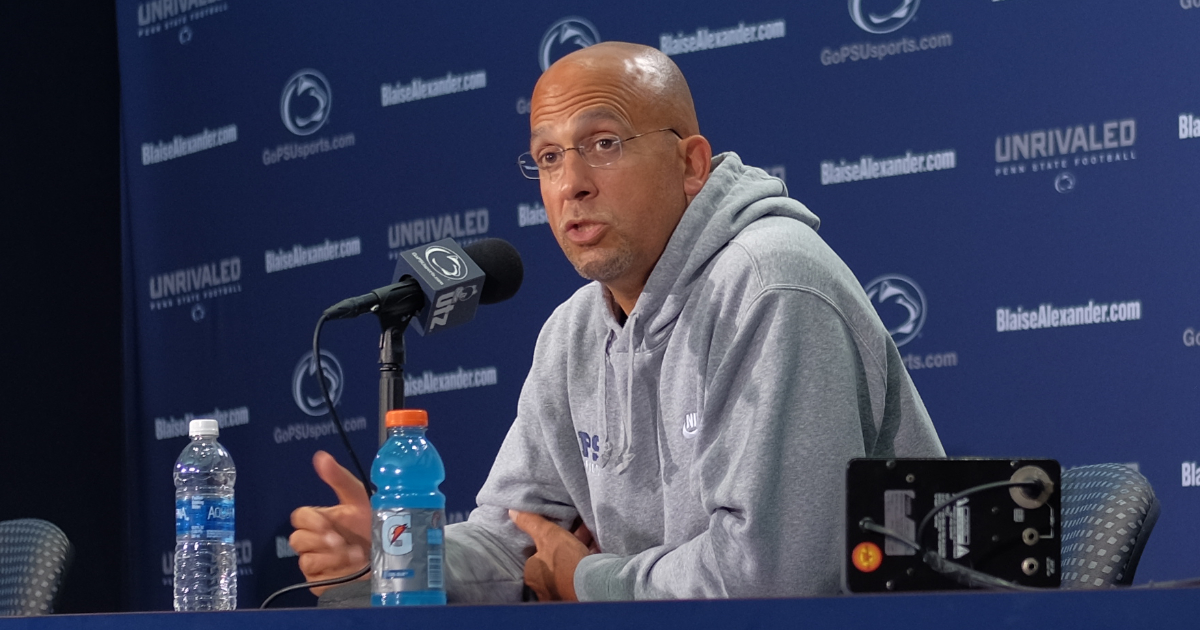Column: With NIL at stake, Penn State must maximize Delaware game

Penn State head coach James Franklin listened intently to the question on Tuesday afternoon at his weekly press conference.
The tight end position is used extensively, but variably, within the Nittany Lions offense. From week to week last year, and again to open the season on Saturday against West Virginia, the likes of Theo Johnson and Tyler Warren were used as blockers. But, unlike Brenton Strange’s six-catch afternoon at Auburn last September, the pair was infrequently the target of passes from new starting quarterback Drew Allar.
Given the wild swings in pass-game production, the head coach was asked, flatly, how that works.
Understanding the question in its specific form, Franklin chose a broader answer. And he did so, sensing an opportunity to interject a dose of reality into an otherwise delicate subject that Penn State must grapple with this season.
“I think it’s an interesting discussion, not just to tight ends, but in general,” Franklin said. “(These are the) things that the media ask. These are things sometimes parents will reach out and ask. About, why their son didn’t get this many touches, or why the ball didn’t go to them.”
The elephant in the room
Pointedly, Franklin made clear that this isn’t a hypothetical.
In the context of college football’s new and evolving reality, the statement serves as a revealing glimpse into the balancing act Penn State football must wage in the coming weeks and months. On a team loaded with talent, managing expectations for reps, opportunities, and statistics is more important than it has ever been in college football.
That’s because reps, opportunities, and statistics are money. They are also the nutrients that prevent dissatisfaction and, ultimately, looks in the transfer portal.
Still an ardent believer in the value of the college athletics model, Franklin won’t state as much so bluntly. A haze that can’t be seen up close and in the moment, both NIL and the threat of transfer stands as the subtext to a multitude of topics, though.
Franklin foreshadowed as much in his weekly radio show comments before the first game. Asked by a fan about players adjusting to new clock stoppage rules this season, and specifically the possibility of running backs not reaching 1,000 yards in a season thanks to the decrease in offensive plays per game, Franklin acknowledged the reality of those ramifications.
“Every possession is more important than it’s ever been. Playing with a lead is more important than it’s ever been because people just have less time to come back on you,” Franklin said. “I’m trying to keep a locker room of egos – and I don’t want that come off the wrong way, because we all have egos – but I’m trying to manage the locker room. And less time and less reps mean less opportunities for guys.”
Tending the garden
On its face, that is a already natural byproduct of creating “the most competitive environment in college football.”
All of Penn State’s football players are in the program to win. That’s winning against the opponents that line up every Saturday in the fall, but also against the teammates sharing the locker room. Winning in practice equates to opportunities in games, and those opportunities translate to NIL marketability and the dollars that come with it.
As detailed by Franklin, though, none of these factors can ever become his coaching staff’s chief concern. Rather, in games, Penn State must take advantage of opponents’ weaknesses to win games. And they’ll prioritize as much to ensure that outcome.
“We have a plan to get the ball to our playmakers every single week, but then once you get to the game, you’re going to take what the defense gives and not force the ball to any players,” Franklin said. “It’s just not the right thing to do.
“That’s going to equal sometimes you rush for 300 yards, other times you throw for 300 yards. That’s going to also equate to some games where the tight ends get 12 touches, and there’s going to be other games where the tight ends get two touches. It’s just how the game plays out.”
Next steps for Penn State football
Franklin’s job is to create the conditions for success that will lead to wins for the Nittany Lions each week this season. He can’t, and doesn’t, avoid dealing with this new reality, though.
With or without the strong, foundational culture Penn State believes is among the best in the game, the Nittany Lions cannot hope and wish these dynamics simply skip over them. Instead, only through keeping a communal, team culture in place, with personal satisfaction attained through team success over individual performances, can the program create that environment.
Saturday afternoon, that juggling act will come into focus against an otherwise easy-to-overlook opponent. Facing the FCS program, Delaware, Penn State has a litany of accomplishments to check off if it wants to maximize the day. In so many ways, though, it’s no longer a secondary luxury to enjoy on top of the 1-0 mantra.
Winning will always be first. Staying healthy by getting starters work and then getting them out is important. Taking that opportunity to develop and keep reserves feeling involved is the back half of that equation. But, on a day in which the quality of the opponent won’t enter the conversation when looking at individual players’ final statistical lines for the year, more is at stake.
For Franklin, his coaching staff, and every player in the Penn State locker room this weekend, that much is deeply understood.
The post Column: With NIL at stake, Penn State must maximize Delaware game appeared first on On3.
